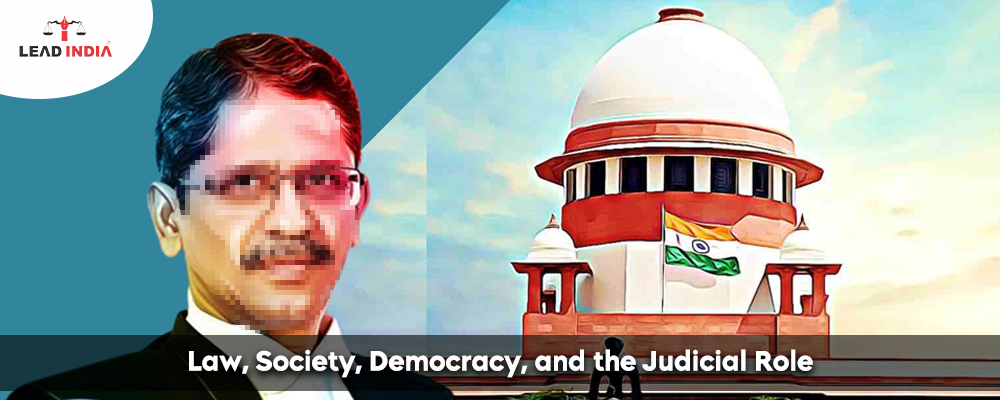India’s judiciary, particularly the higher judiciary, plays a crucial role in upholding the federal principle, interpreting laws, testing their validity, and protecting citizens’ fundamental rights. The Supreme Court is the highest court established under the Constitution. The court is responsible for maintaining federal principles, validating laws and executive actions, and enforcing people’s fundamental rights.
In a welfare state such as India, the judiciary, particularly the Supreme Court, is crucial. In recent years, the Indian judiciary, particularly the Supreme Court, has taken an active role. The term “judicial activism” is subjective and lacks a clear definition. Judges may see it as dynamism, inventiveness, legislation, or a push for “social revolution” through the judicial system.
Academics and jurists, necessitating a re-evaluation of the judiciary’s functions, have defined the concept of “Judicial activism” differently. The constitutional duties of the judiciary are that while performing its functions
The Constitution aims to protect, promote, and provide for social and economic purposes, which should be considered when exercising powers. Respecting and appreciating the roles of the state’s three organs within their respective spheres can lead to concord and bring about socio-economic reforms in the country.
Need A Legal Advice
The internet is not a lawyer and neither are you. Talk to a real lawyer about your legal issue

The role of the judiciary in India’s democratic system
A notable Indian jurist defines judicial activism as follows. “Judicial Activism is a method of exercising judicial power that aims to establish power relations among dominant state institutions led by members of the ruling classes.” The term “Judicial activism” remains an abstract idea that has not been defined. It cannot be formulated solely by definition.
The motives for judicial activism are difficult to determine under any constitution. The reasons for judicial activism and judicial power cannot be universally accepted due to competing interests and beliefs among diverse groups in society.
Law, Society, Democracy, and the Judicial Role
The trinity of democracy, liberty, and the rule of law is widely recognized as the hallmarks of civil society. Democracy refers to a government that is run by and for the people. Individual liberties are a natural extension of democracy. The goal is to establish laws that manage society and balance competing interests.This is why “the rule of law” is essential. The concept emphasizes the importance of law above anarchy or arbitrary behavior. Equal accountability under the law applies to all individuals, regardless of their standing.
Democracy is a style of administration that prioritizes human dignity and rights and has been practiced for centuries. The concept suggests that all citizens have the right to participate in decision-making processes that result in the adoption of relevant policies for society. This implies limitations on majority decision-making and the need to safeguard some fundamental rights. Maintaining an equilibrium among competing interests, demands, restraints, and compulsions is crucial for any developing civic society.
India was formed as a democratic welfare state with equal opportunities for all, regardless of caste, creed, color, gender, or other forms of discrimination. The goal was to provide equal opportunities for personal progress and contribution to the nation. The definition of democracy is “government by, of, and for the people.” The founding fathers of contemporary India interpreted the phrase “for the people” to emphasize the importance of creating a governing system that prioritizes the wellbeing of its citizens.
Law and Society
Law and society are inextricably linked and have an important role in molding one another. In a diverse and complicated country like India, the relationship between law and society is complex, with legal systems reflecting and influencing social processes.
In India, the legal framework, which includes laws, judicial rulings, and legal institutions, interacts with the country’s social, cultural, and political backdrop to shape conduct, maintain social order, and promote justice.
- Laws as standards of conduct: In India, laws serve as ethical principles that govern social behavior. They provide norms and rules for individuals and organizations to follow, defining acceptable behavior and explaining the consequences of noncompliance.
- Laws as tools for social change: Laws in India reflect and shape social change. Legal systems can be utilized to foster social growth and address societal issues. In recent years, India has seen considerable law reforms addressing topics such as gender equality, LGBTQ+ rights, and environmental preservation.
- Laws as a tool for social justice: Laws in India play an important role in fostering social equity. The Indian Constitution guarantees fundamental rights such as the right to equality, the right to free speech and expression, and the right to life and liberty, all of which are intended to ensure social fairness and preserve individual rights.
Lead India offers free legal advice and online information, in addition to other legal services. We provide a forum to speak with a lawyer and ask legal questions. Lead India’s solicitors can help you with any legal difficulties. Lead India’s solicitors may assist you with any legal issues. Lead India also provides free online legal help in India. In addition to giving online legal assistance, Lead India allows users to ask specialist questions for free.





 Talk to a Lawyer
Talk to a Lawyer